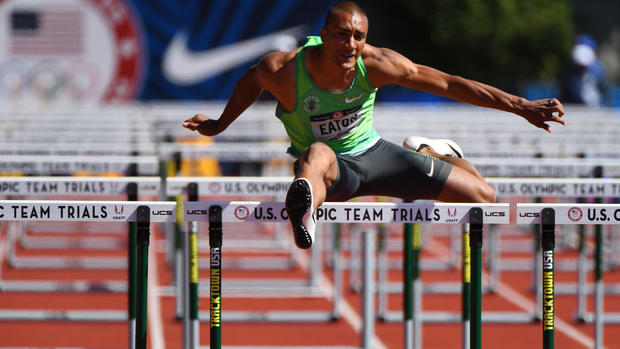Meet the star rookies of the 2016 USA Olympic Swim Team
More than 11,000 athletes are getting ready to get down to business Saturday in Rio and swimming will be one of the big sports in the spotlight.
All eyes will surely be on big names like Michael Phelps, who already has 22 Olympic medals to his name and has hinted that this will be his last go-round.
So who will carry the Olympic torch going forward?
Fortunately, the U.S. team is packed with Olympic newbies who could become the next big American star of the pool, reports CBS News correspondent Jamie Yuccas.
"It's a great group of kids, and an eager group of kids who are ready to kind of take over after some of us step out of the sport," Phelps said at a press conference in San Antonio last month.
Of the 45 swimmers on the U.S. Olympic team this year, 30 of them are competing in the games for the very first time.
Among them is 21-year-old Ryan Murphy, who currently holds the American records in the 100- and 200-meter men's backstroke. He's believed to have a solid shot at gold in Rio.
"I honestly do not feel like it's set in yet -- that I'm an Olympian, you know, this has been my dream," Murphy said.
His dream started at age 7 when he wrote and illustrated a short book in library class, boldly stating that he was going to be an Olympian.
"When I made the 100 back, I threw my arms up and I looked down. It didn't feel right for me to just take it all in, and that all of these people were cheering for me," Murphy said. "That's still something that I'm getting used to -- the attention and just having that confidence to be able to stand there and be like, 'I'm one of the best.'"
Also in that elite club is 19-year-old Caeleb Dressel, competing in the 100-meter freestyle race. Considered the best young sprinter in the U.S., he grew up one town over from Murphy in northern Florida.
"I remember watching Caeleb at a summer week meet," Murphy said. "I was 6 years old I think, he was 5, and they were like, 'This kid is going to break your records!'"
Dressel didn't just break Murphy's records. As one of the youngest male swimmers at the 2012 Olympic trials, he also bested age group records previously held by none other than Michael Phelps. Then two years later, he took an almost six-month break from the pool.
"I was dealing with some mental demons at the time. I kind of lost track of my love for the sport, so I think I needed that time off. I wouldn't have changed anything," Dressel said. "I don't think I'd be where I'm at right now if it weren't for the time I took off."
On the women's side, 21-year-old Leah Smith is swimming the 400- and 800-meter freestyle competitions -- races she qualified for just behind 2012 gold medalist Katie Ledecky.
"I was in a pretty good position to make it, but it doesn't beat, like, touching the wall and seeing the number by your name," Smith said. "And then just, when I touched the wall, Katie looked at me and it was like, 'we're going to Rio!'"
"I was a rookie in 2012 and I feel like it's still just as exciting this time around, and I think a large part of that probably has to do with seeing the excitement from the rookies," Ledecky said.
David Marsh is the head coach for the U.S. women's swim team. It's his job to mold the new kids on the squad into Olympic champions.
"You have so many young swimmers on this team. How does that change how you coach?" Yuccas asked.
"What it does is it allows us to really utilize the veterans on the team to kind of set the tone," Marsh said. "Three billion people are going to be watching this swim meet, you know, and there's going to be a crazy, crowded facility. It's going to be very different than anything they've ever experienced, and what we want to try to do as coaches is make it as simple and calm as possible. It's a swim meet, it happens in the water, and that's what they need to know."
One of the best hopes for American gold is 19-year-old Lilly King, who currently has the world's fastest time in the women's 100-meter breaststroke.
"You see the big names and now you're hanging out with them. What is that like?" Yuccas asked.
"It's a little weird, to be honest. I was a little bit star-struck at the beginning but I'm starting to pretend that they're like normal people, because they are," King said.
When the veterans and rookies come together, "I think both parties benefit," Smith added. "We get a lot of great advice, and we get to look up to our role models, and then they get inspiration from people that they wouldn't have before."

